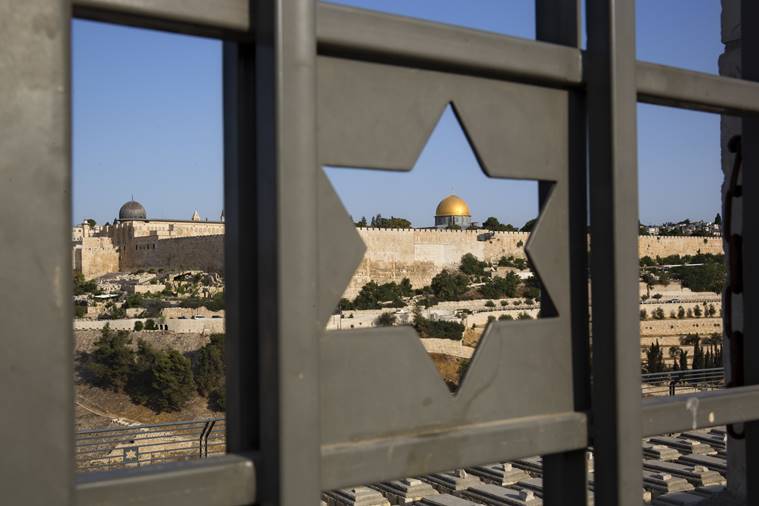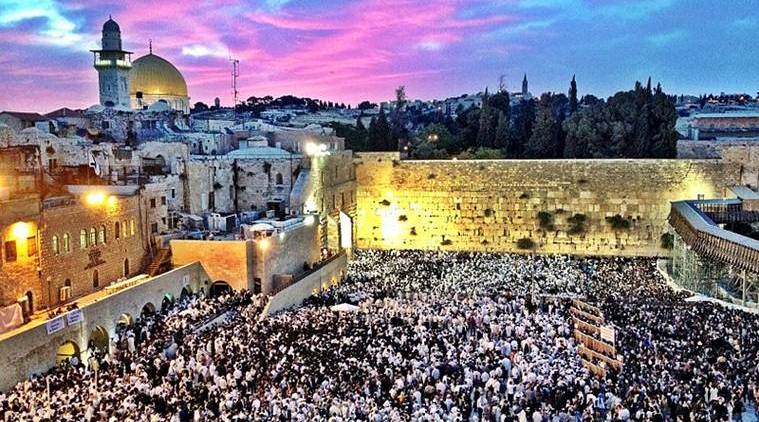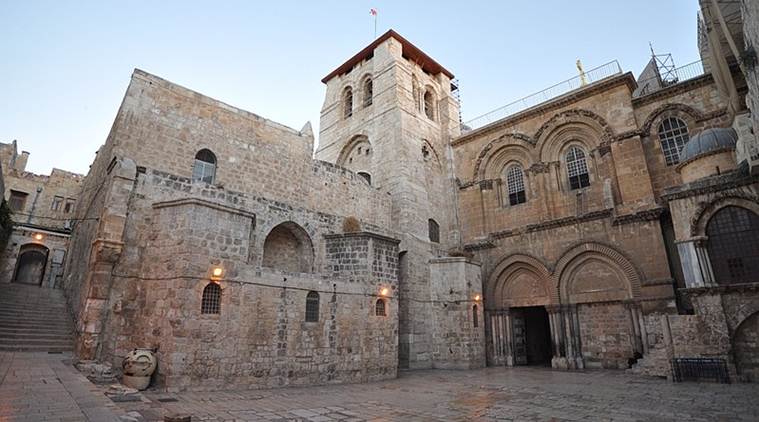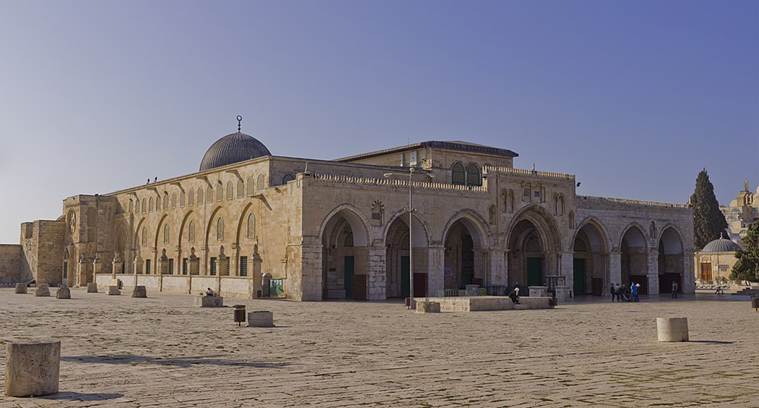 The holiest of the holy cities, and yet the bloodiest of them all, Jerusalem is noted for being the most disputed city in the world. (Wikimedia Commons)
The holiest of the holy cities, and yet the bloodiest of them all, Jerusalem is noted for being the most disputed city in the world. (Wikimedia Commons)
Medieval Arab geographer al-Muqaddasi once called Jerusalem “a golden bowl full of scorpions”. The holiest of the holy cities, and yet the bloodiest of them all, Jerusalem has remained the most disputed city in the world.
After the First World War ended, Jerusalem had been partitioned between Palestinian and Israeli control. The situation remained so, up until the six-day Arab-Israeli war, when East Jerusalem was annexed by Israel and 200,000 Jewish settlers added into the hitherto predominantly Arab territory. But the dispute over Jerusalem ran much deeper, going back thousands of years when the territory has been dethroned and claimed over and again by different communities and subcommunities, all in the name of God.

 Jerusalem’s Old City is seen through a door with the shape of star of David. (AP Photo)
Jerusalem’s Old City is seen through a door with the shape of star of David. (AP Photo)
Karen Armstrong, a scholar of comparative religion, notes in her work that one of the earliest manifestations of faith among religions across the globe is the development of what is called ‘sacred geography.’ “Jerusalem has – for different reasons – become central to the sacred geography of Jews, Christians, and Muslims. This makes it very difficult for them to see the city objectively, because it has become bound up with their conception of themselves and the ultimate reality- sometimes called ‘God’ or the sacred,” she writes in her book, ‘Jerusalem-One city, three faiths.’
The sanctity that each of these religions associates with Jerusalem is frequently validated through episodes from the past, which are often difficult to discern as mythical or historical. Biblical historicity claims Jerusalem to be the place where Abraham prepared to sacrifice his son and where Jesus walked and spoke to his disciples and was crucified. At the same time, Jerusalem also happens to be the place where Islamic practitioners believe that Muhammad’s night journey took him to heaven. As noted by Professor Simon Goldhill, “The intensity of feeling that Jerusalem provokes is intimately tied to the claim that ‘this is the very place where…’.”
The holy city of Jews
The city that would go on to become Jerusalem was situated close to the ancient city of Canaan, corresponding to present-day southern Levant. Biblical traditions tell us that in about 1250 BC, 12 tribes under the leadership of Moses escaped from Egypt and lived a nomadic life near the Sinai peninsula. They were convinced that their God had promised them the fertile land of Canaan. Yet it was only under the leadership of Moses’ son Joshua that the tribes stormed into Canaan and made the territory theirs, in the name of God. Yet they had not been able to dismiss the Jebusites, who were considered the original inhabitants of Jerusalem. It was only under the ruler of David in about 1000 BC, that Jerusalem would go on to become the capital of Israel and central to Jewish traditions. Yet he did not attempt at trampling over local religious traditions of the place and has been noted by historians of religions, a number of symbols of pagan rituals in Jerusalem are known to have peacefully become part of Jewish religious conventions.

 It was only under the ruler of David in about 1000 BC, that Jerusalem would go on to become the capital of Israel and central to Jewish traditions. (Wikimedia Commons)
It was only under the ruler of David in about 1000 BC, that Jerusalem would go on to become the capital of Israel and central to Jewish traditions. (Wikimedia Commons)
Yet it is important to remember that what we know of Biblical traditions is being written thousands of years after the actual event is known to have taken place. This is especially true of the stories around characters like Abraham, Isaac and Jacob, the three patriarchs of Israel which had over time become the strongest aspects of Jewish identity. “The biblical writers knew nothing about life in the nineteenth and eighteenth century Canaan, but the tales of the patriarchs are important because they show how the Israelites were beginning to shape a distinct identity for themselves,” writes Armstrong.
The holy city of Christians
As per the New Testament, Jerusalem was the city where Jesus was brought as a child and where he is believed to have preached, healed and was later crucified. Historian Dan Mazar had reported in the Jerusalem Christian Review a series of archaeological discoveries in Jerusalem that proved the place’s association with Christianity by the turn of the first millennium AD.
However, Jerusalem’s purported association with Christianity needs to be located in the geopolitics of the place from the first century on. By 323 AD, Constantine had become the sole emperor of the Roman world. A staunch believer in the Church, he hoped that over time Christianity would become a cohesive force in his far-flung empire. By this time, though Palestine had a small number of Christians, the religion had clearly emerged as an attractive force. Constantine decided that instead of forcing the religion upon the inhabitants of his empire, he would undertake a huge building programme focusing on the symbols of the religion. Yet he was aware that in order to give religious sanctity to an empire, it must be shown to have strong roots in the past. Accordingly, his supporters started drawing analogies between Christianity and the religion of Moses and his descendants, whereupon it was necessary to anchor religious sanctity in one geographical territory.
 The Sepulcher of Christ in Jerusalem. (Wikimedia Commons)
The Sepulcher of Christ in Jerusalem. (Wikimedia Commons)
Knowing that a Christian empire needed symbols and monuments for it to be given historical significance, Constantine drew up a massive plan of archaeological excavation in Jerusalem. Soon after, a rock tomb was discovered beneath the old temple platform, which was immediately declared to be the Sepulcher of Christ. The magnificent discovery was significant to Christian faith, for it was believed that Christ rose from that very tomb. The discovery of the tomb had an appeal unlike anything else on Christian imagination, giving Jerusalem a central place in their theological belief system.
Most Read 1Israel-Palestine News Live Updates: Israel warns of long war; at least 313 Palestinians killed in Gaza air strikes 2One Scindia makes way for another? BJP abuzz after Yashodhara Raje bids ‘goodbye’ to Shivpuri 3Threat to kill PM, blow up Modi stadium: Security agencies on alert as email demands Rs 500 cr, release of Lawrence Bishnoi 4Kajol says she doesn’t seek professional ‘validation’ from Ajay Devgn: ‘We have 2 kids, 4 cars and 2 dogs to talk about’ 5Dono box office collection day 1: Sunny Deol’s son Rajveer Deol’s debut film tanks, makes Rs 1 crore less than Karan Deol’s Pal Pal Dil Ke Paas
The holy city of Muslims
Although the Quran never mentions Jerusalem, the city is believed to hold strong sentimental value for Islamic belief. Islamic belief states that the Prophet first directed prayers at the direction of Jerusalem, before the Kaaba at Mecca came to take its place. Right from the time of the inception of Islam, ‘Allah’ was believed to be the same God as worshipped by the Christians and the Jews. When Muhammad asked his converts to pray to Allah, he told them to face Jerusalem, which was the spiritual centre of the Jews and Christians, and so had to be appropriated for the Muslims as well.
 The Al-Aqsa mosque in the old city of Jerusalem. (Wikimedia Commons)
The Al-Aqsa mosque in the old city of Jerusalem. (Wikimedia Commons)
Jerusalem soon became a symbol of Islamic identity for the Muslims. “The city had become a symbol that had helped them to form a distinct Islamic identity, to turn their backs on the pagan traditions of their ancestors and seek a new religious family,” notes Armstrong. Yet at the same time, Jerusalem for the Muslims also signified a continuity of monotheistic religious traditions as followed by the Jews and Christians, who they considered to be their predecessors. Accordingly, the Muslim arrival in Jerusalem was a homecoming of sorts, a way of returning to the same place that was considered holy among their predecessors.
Also ReadWhy India is special to Armenians: Their land of prosperityLaw panel’s ‘piecemeal’ approach on UCC: Here’s how the Constituent Assem…When BR Ambedkar defended time taken for drafting constitutionHere is what happened in Kedarnath, and rest of Uttarakhand, in 2013
The first Muslims settlers arrived at Jerusalem in the seventh century AD and over the next few centuries, the city came to be captured and recaptured by various Muslim dynasties, until 1917 when the British captured it. However, the city continued to be a matter of dispute among the three religions and would soon go on to be divided along religious lines once the British decided to leave.

